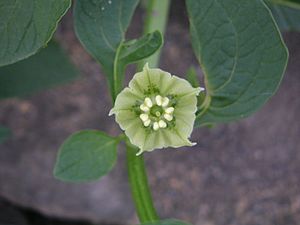Jaltomata facts for kids
Quick facts for kids Jaltomata |
|
|---|---|
 |
|
| Jaltomata procumbens flower | |
| Scientific classification |
|
| Kingdom: | Plantae |
| Clade: | Tracheophytes |
| Clade: | Angiosperms |
| Clade: | Eudicots |
| Clade: | Asterids |
| Order: | Solanales |
| Family: | Solanaceae |
| Subfamily: | Solanoideae |
| Tribe: | Solaneae |
| Genus: | Jaltomata Schltdl. |
Jaltomata is a group of plants that belongs to the nightshade family, also known as Solanaceae. This family includes many well-known plants like tomatoes, potatoes, and eggplants. Scientists believe that Jaltomata is a close relative of the Solanum genus, which contains these popular foods.
You can find Jaltomata plants growing across a wide area. They are native to the Americas, from the southwestern United States all the way through Latin America and into the Andes mountains in South America. These plants come in many different shapes and sizes. Some are small, trailing herbs, while others stand tall as erect herbs or even grow into woody shrubs.
Jaltomata plants also have a variety of flowers and fruits. Their flowers can differ in size, shape, and color. The fruits can be red, green, orange, or even dark purple. Interestingly, people in Latin and South America eat the fruits of some Jaltomata species.
What's in a Name?
The name Jaltomata comes from an ancient language called Nahuatl. This language was spoken by the Aztec people in Mexico. The original Nahuatl word was xāltomatl, which means "sand tomato." This name was first used for a specific plant called Jaltomata procumbens.
When the Nahuatl word xāltomatl was borrowed into Mexican Spanish, the "X" sound changed. In Nahuatl, the "X" sounds like "SH" in English. But when it became "J" in Spanish, it started to sound like the "H" in English. So, when botanists from Mexico and the United States say "Jaltomata," they pronounce the "J" like an "H."
Many Kinds of Jaltomata
There are many different types, or species, of Jaltomata plants. Each species has its own unique features. Scientists are always studying these plants to learn more about them. They discover new species and learn how they are related to each other. This helps us understand the amazing diversity of plant life on Earth.
See also
 In Spanish: Jaltomata para niños
In Spanish: Jaltomata para niños
 | Charles R. Drew |
 | Benjamin Banneker |
 | Jane C. Wright |
 | Roger Arliner Young |

